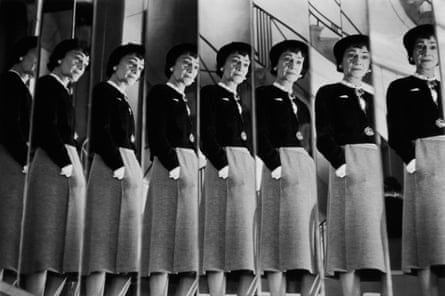Coco Chanel Unbuttoned, a film-length documentary about the life of the designer, concentrates as you might expect rather more on the fashion side of things than the involvement of Gabrielle (as she was born) with the Germans in wartime Paris. Facilitated by commentary from various experts in fashion generally and Chanel specifically – biographers, former assistants, friends and models – the film works through her indubitably fascinating life in stern chronological order. From that unhappy beginning we see her escape the dutiful life the nuns had planned for her by moving to the garrison town of Moulins and becoming, effectively, a courtesan (photographs of Gabrielle in full Edwardian fig bring home the scale of her eventual influence brilliantly). Those years may have resulted in the birth of a son, Andre, passed off as her sister’s child. It is a measure of the thoroughness with which Chanel obscured the facts of her life that no one has ever been able to confirm it. Her childhood had taught her how to survive by adapting to circumstances … is the general view

Her first business ventures were bankrolled by her long-time lover Captain Arthur “Boy” Capel (“the great luck in my life … a man who didn’t demoralise me”) and even the first world war could not halt her success. Her actions in the next one are not glossed over but they are minimised. Her childhood had taught her how to survive by adapting to circumstances is the general view. This might hold up if every semi-orphaned child had an affair with a Nazi officer, a codename and spy number from the SS intelligence, and was given the job of transporting a message to Churchill from the Third Reich via her aristocratic connections. But they didn’t. The other explanation proffered is that she was in a relationship with a rightwing man and always took on the politics of others. Unfortunately, she is elsewhere repeatedly claimed as a feminist revolutionary. You can’t have it both ways. A little more unpacking of her behaviour here might not have gone amiss.
There is at least space carved out for her attempt to gain ownership of the 90% of her famous Chanel No 5 perfume business that was owned by the Jewish family who financed it – by invoking the Nazi race laws. She didn’t succeed but as biographer Justine Picardie notes, she tried. “She did do that.”
After a 10-year postwar exile in Switzerland she came back with a vengeance and conquered America and, in time, just about everywhere else. As vintage pieces of Chanel are lovingly unwrapped by curators in various museums, even the most untutored eye can see why. Genius is worked into every stitch. Towards the close of the film, the question of how we reconcile this beauty with the moral ugliness is hinted at, then swerved away from in favour of a bizarre series of cameos from modern celebrities about their love of Chanel. These form an unexpectedly unstylish – dare I say it, vulgar – end to a hitherto impeccably put together, if borderline hagiographic, piece. Like the wrong shoes with a little black dress. Chanel would have had something to say about that.
After a 10-year postwar exile in Switzerland she came back with a vengeance and conquered America and, in time, just about everywhere else. As vintage pieces of Chanel are lovingly unwrapped by curators in various museums, even the most untutored eye can see why. Genius is worked into every stitch. Towards the close of the film, the question of how we reconcile this beauty with the moral ugliness is hinted at, then swerved away from in favour of a bizarre series of cameos from modern celebrities about their love of Chanel. These form an unexpectedly unstylish – dare I say it, vulgar – end to a hitherto impeccably put together, if borderline hagiographic, piece. Like the wrong shoes with a little black dress. Chanel would have had something to say about that.

No comments:
Post a Comment